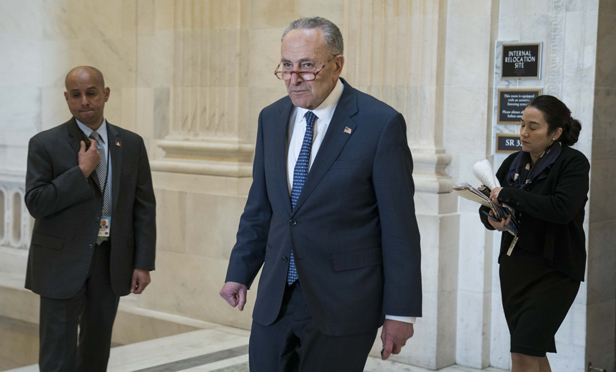 Senate Minority Leader Chuck Schumer, D-N.Y., at the Russell Senate building. (Photo: Sarah Silbiger/Bloomberg)
Senate Minority Leader Chuck Schumer, D-N.Y., at the Russell Senate building. (Photo: Sarah Silbiger/Bloomberg)
Attempting to reverse President Donald Trump's payroll tax deferral order, Sens. Chuck Schumer, D-N.Y., and Ron Wyden, D-Ore., are pressing the Government Accountability Office to determine whether the recent Treasury Department and IRS guidance implementing the order is a "rule" under the Congressional Review Act.
The act allows Congress to undo rules issued by federal agencies via a joint resolution of disapproval in the Senate.
Recommended For You
"President Trump's plan at best gives no help to workers and at worst saddles lower to middle-income Americans with a tax bill the Treasury Department has said will have to be repaid by April next year," Schumer and Wyden said Wednesday in a letter to GAO.
Under Trump's presidential executive order issued Aug. 8, employers can defer the 6.2% tax for employees whose taxable wages are less than $4,000 during a bi-weekly pay period — equivalent to roughly $104,000 annually — from Sept. 1 through Dec. 31.
Rep. John Larson, D-Ct., chairman of the House Ways and Means Social Security Subcommittee, said the same day that he plans to introduce legislation to "overturn" Trump's payroll tax deferral and work with the Senate to initiate a Congressional Review Act resolution.
"This order is reckless, unworkable, and gives new meaning to the term 'surprise billing,'" Larson said in a statement. "Early next year Americans will be required by Trump to pay double to make up for this pointless charade! Trump has said he will 'terminate' payroll taxes completely if he wins a second term, defunding Social Security. Eliminating these payments is the first step towards a long-time conservative dream to end Social Security as we know it."
Schumer and Wyden reiterated their argument that the Trump administration's payroll tax deferral plan will also "bankrupt Social Security and endanger the retirements of millions of Americans," as Trump has also said he "intends to 'make permanent cuts to the payroll tax' if re-elected."
Schumer and Wyden, as well as Sen. Chris Van Hollen, D-Md., prodded Social Security Administration Chief Actuary Stephen Goss in mid-August to conduct an analysis on the impact of "hypothetical legislation" eliminating the payroll tax.
Goss responded on Aug. 25 that if the payroll tax were eliminated with no alternative source of revenue enacted, the Social Security Disability Insurance (DI) Trust Fund would become "permanently depleted in about the middle of calendar year 2021, with no ability to pay DI benefits thereafter," and that the the Old Age and Survivors Insurance (OASI) Trust Fund would follow in mid-2023.
But House Ways and Means Republican leader Kevin Brady, R-Texas, and Senate Finance Committee Chairman Chuck Grassley, R-Iowa, told Goss in an Aug. 31 letter to set the record straight, saying that his response to the Democrats inspired "fearmongering" and that his position was "being used to perpetuate falsehoods in the run-up to a Presidential election."
© 2025 ALM Global, LLC, All Rights Reserved. Request academic re-use from www.copyright.com. All other uses, submit a request to [email protected]. For more information visit Asset & Logo Licensing.







